Understanding what is shadow banning on Facebook is important for more than one reason. As one of the biggest and most popular social media sites, Facebook is a place where people can talk, share news, and look at ads. Shadow banning on Facebook can have big effects on how people use the internet and how free they are to say what they want, as well as on businesses that depend on the site for marketing and reaching out to customers. By digging deeper into this topic, we hope to shed light on how shadow banning works, what it means, and what ethical questions it raises. This will help users and organizations manage the constantly changing digital world with more knowledge and strength.
Understanding Shadow Banning
Shadow banning, also called stealth banning, ghost banning, or comment ghosting, is when a person’s content is hidden from other people without the user being told. Most of the time, the user won’t even know that their posts, comments, or other contributions are being hidden because they will still see their content as if it were available to everyone.
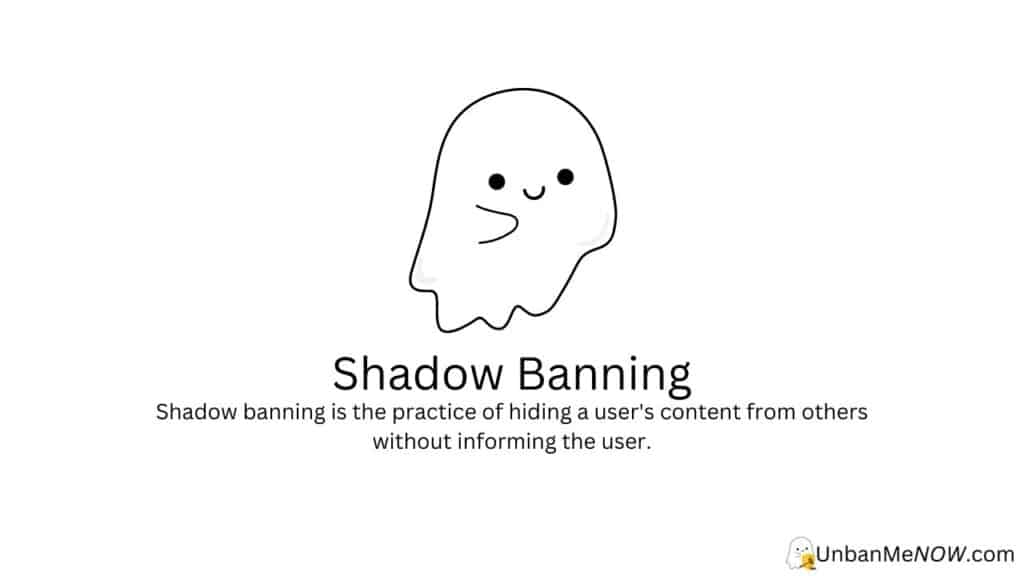
The main purpose of shadow banning is to reduce the effect of a user’s bad behavior on the platform while stopping them from making new accounts to get around the ban. It’s less direct than traditional banning, and it’s a better way to control material because it’s less confrontational and doesn’t draw attention to itself.
Comparison to Traditional Banning
Traditional banning, which is often called a “full ban” or “suspension,” is a more direct and obvious way to control material. Usually, when a user is banned, their account is either temporarily or completely shut down. This means they can’t use the platform, post content, or talk to other users. The user who has been banned usually finds out about it through an email or a message that appears when the user tries to log in.
There are some major differences between shadow banning and regular banning:
- Visibility: In a standard ban, the user knows that their account has been limited, but in a shadow ban, they don’t know that their content is being hidden from other people.
- Escalation: A traditional ban is often the last step in a set of punishments that get worse when rules are broken. Shadow banning, on the other hand, is usually done without telling the person or getting their permission first.
- Reversibility: Traditional bans can usually be overturned, and if the case is successful, the user’s account may be reactivated. Shadow bans are harder to fight because the user might not even know they were banned in the first place.
- Impact: Traditional bans make it impossible for the user to use the platform at all, while shadow bans let the user keep using the platform, but with less reach and exposure.
What is Shadow Banning on Facebook
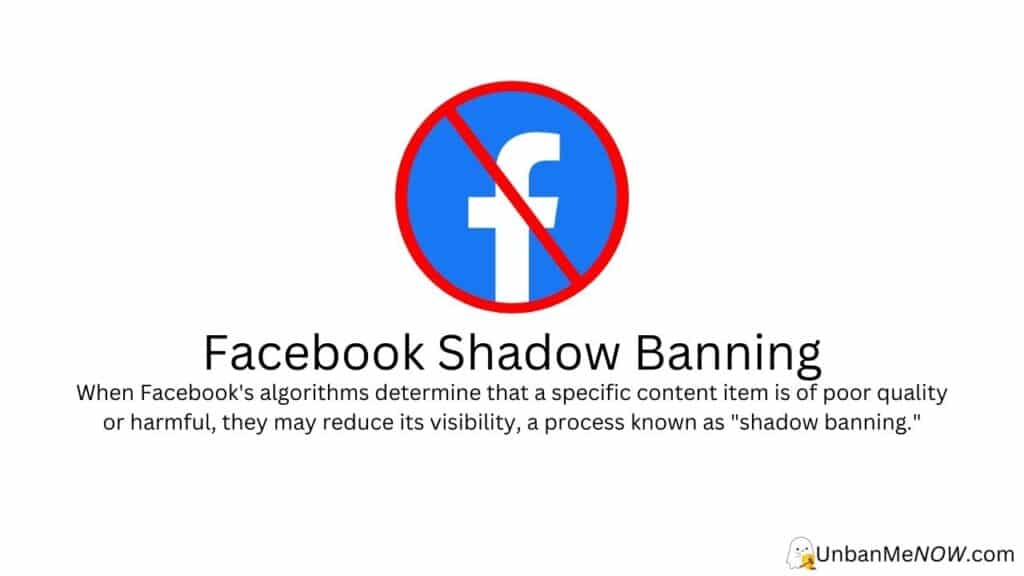
Facebook uses algorithms to decide what material to show and what not to show. These algorithms look at things like the type of content, the user’s behavior, and the amount of engagement with the content to figure out how relevant and good it is. If Facebook’s algorithms think that a piece of content is of low quality or damaging, they may make it less visible, which is called “shadow banning.”
For example, if a user constantly posts trash or low-quality content, Facebook’s algorithms may start to make it harder for their posts to be seen by a large number of people. This is done to protect the platform’s users and stop harmful material from spreading.
Identifying Shadow-Banned Content
Shadow-banned content can be hard to find because it is made so that the user who shared it can’t see it. But there are some signs that you might have been shadow-banned on Facebook:
- Your posts aren’t showing up in your friends’ or fans’ News Feeds or search results.
- Your content is not receiving any likes, comments, or shares.
- Your account’s reach has dropped by a lot, which means that your posts aren’t getting to as many people as they used to.
- You are unable to join groups or participate in certain talks.
If you think you or your content has been shadow blocked, you should look at Facebook’s community standards and make sure that your content follows their rules. If you think that your Facebook account was shadow banned by mistake, you can ask Facebook’s support team for help.
Impact on Engagement and Visibility
Shadow banning can have a big effect on engagement and exposure because it limits how far your content can be seen. This means that your posts aren’t showing up in your friends’ or fans’ News Feeds or search results. This makes it harder for them to interact with your content.
Shadow banning can also make your account less visible on the site as a whole. This can make people less interested in what you post because fewer people are seeing it, and it can also make it harder to grow your Facebook following.
Reasons for Shadow Banning on Facebook
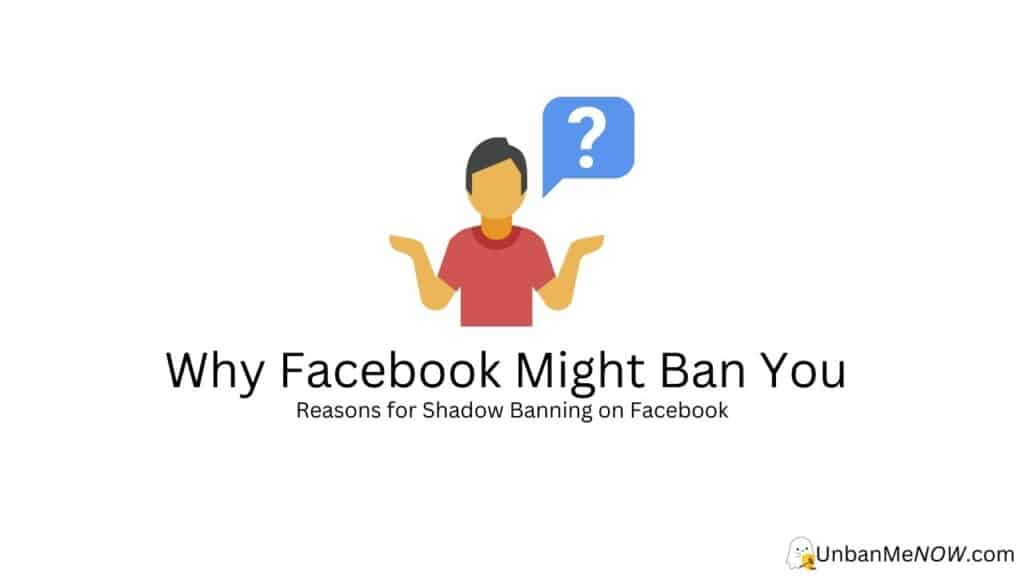
Let’s talk about why Facebook might ban you in the background and what you can do to stop it.
Violation of Community Guidelines
Facebook has a set of rules for the community that all users should follow. These rules are meant to keep everyone safe and treat everyone with care. Hate speech, bullying, harassment, and sharing violent or graphic content are all common things that can get you shadow banned. If Facebook finds that a user has broken its rules, their posts may not show up in the feed and they may not be able to reach as many people.
Spam or Misleading Content
Facebook users who spread spam or misleading content are also known to be “shadow banned.” Spam is the term for messages or posts that are sent to a lot of people without being asked and that are sent over and over again. On the other hand, misleading content refers to posts that give fake information or are meant to trick users. Shadow banning is a way for Facebook to stop users from sharing spam or false information that could hurt the platform and its users.
Political Bias or Controversial Topics
Facebook can also shadow ban you if you have a political bias or talk about things that are controversial. The platform may decide that a user’s political views or opinions on certain issues are harmful or divisive and limit their reach to protect the community. This can be about things like climate change, immigration, gun control, and other things. But it’s important to remember that Facebook has said it doesn’t ban people because of their political ideas or opinions.
False Positives and User Mistakes
Shadow banning can sometimes happen because of false positives or mistakes made by the user. For instance, a user might post spam or break the rules of the community without understanding it. In these situations, Facebook’s automatic systems might figure out that the user made a mistake and ban them in secret. Also, Facebook’s algorithms aren’t perfect, so sometimes they mark material as spam or against the community rules when it isn’t.
How to Identify if You Are Shadow Banned on Facebook
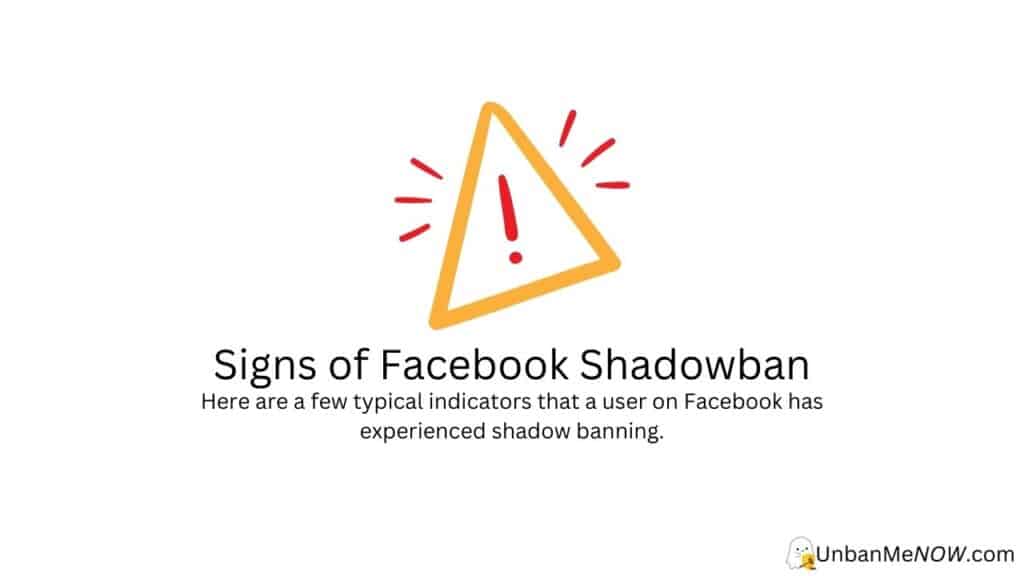
Here are some common signs that someone on Facebook has been shadow-banned:
- Reach: If your posts aren’t getting as many views as they used to, this could be a sign that you’ve been shadow banned. This means that your posts aren’t showing up in the news feeds of the people who follow you or in the news feeds of Facebook users in general.
- No Notifications: If you don’t get messages when people like, comment, or share your posts, it’s possible that your account has been shadow banned.
- Low engagement: If your posts are getting fewer likes, comments, and shares than normal, this could also be a sign that you are being shadow banned.
- Trouble Finding Your Profile: If you can’t find your Facebook profile when you look for it, this could mean that you’ve been shadow banned.
Tools and Techniques to Verify Shadow Banning
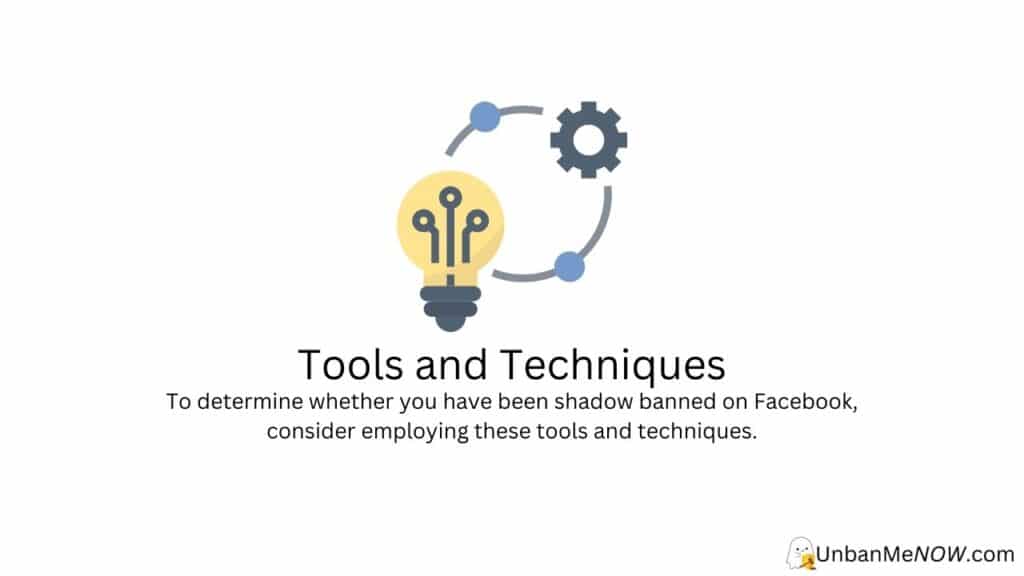
You can use the following tools and methods to find out if you have been shadow banned on Facebook:
Facebook Insights: Facebook Insights tells you how far your posts travel and how many people interact with them. If your reach and activity go down a lot, it could mean that you have been shadow banned.
Third-Party Tools: You can use a number of third-party tools to find out if you’ve been shadow banned on Facebook. Social Blade and ShadowBan.eu are two well-known ones.
Ask a Friend: You can also ask a friend to look at their page to see if they can see your posts. If they can’t, you’ve probably been banned from the shadows.
Check Your Settings: You can also check your Facebook settings to make sure that your posts are set to “Public” and that your privacy settings aren’t hiding your content.
Communicating with Facebook Support
If you think you have been “shadow banned” on Facebook, you can contact Facebook help to find out what happened. This is how:
- Visit the Facebook Help Center: Click on the “Report a Problem” button in the Facebook Help Center.
- Choose the correct category: Choose the area that best describes the problem you’re having, such as “My Account is Limited.”
- Provide Details: Fill out the form with as much information as you can, including any screenshots or proof that are important.
- Submit the Form: When you’re done filling out the form, click “Submit” to send your request to Facebook’s help team.
Tips to Avoid Shadow Banning on Facebook
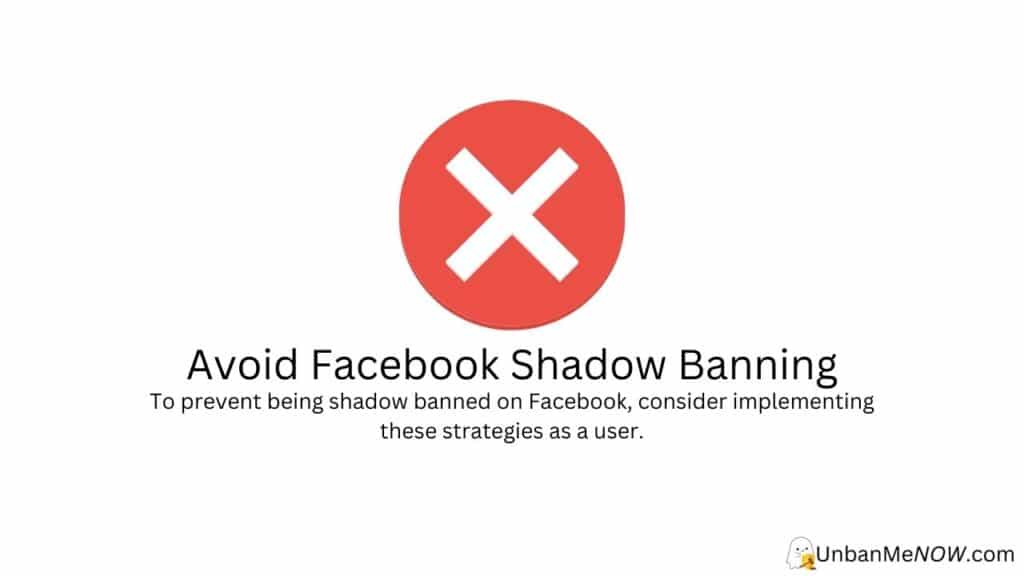
If you use Facebook, here are some things you can do to avoid getting shadow banned:
Adhering to Community Guidelines
It’s important to get to know Facebook’s community rules, which explain what kind of behavior and content are okay on the site. Some of the most important rules are that you shouldn’t post hate speech, bullying, graphic violence, or material for adults. If you share something that goes against these rules, your account could be punished and your posts could be hidden, which could lead to a shadow ban.
Authentic and Quality Content
Facebook likes content that is original and of good quality because it keeps users interested and encourages important interactions. If you share low-quality or spammy content over and over again, your account could be flagged and your posts could be deleted. To prevent this, focus on making content that is real, interesting, and relevant to your audience and fits with the values of your brand.
Avoiding Engagement Baiting
This is a method where users post content that is meant to get their followers to interact with their posts, like by asking for likes or comments. This kind of material breaks Facebook’s rules for the community and can lead to a “shadow ban.” To avoid this, don’t use manipulative methods. Instead, focus on making material that is real, useful, and draws people in naturally.
Regularly Reviewing and Updating your Content Strategy
Facebook’s algorithms and community rules are always changing, so it’s important to regularly review and update your content strategy to make sure it’s in line with the platform’s current standards. This means keeping an eye on how your account is doing, looking at how engaged your audience is, and making changes to your content strategy as required. By keeping up with the latest rules and best practices, you can avoid being “shadow banned” and make sure your Facebook content is seen by more people.
How to Easily Remove the Shadow Ban on Facebook
UnbanMeNow makes it easy to remove the Facebook shadowban. Here’s a step-by-step guide:
Select Platform: Go to the UnbanMeNow website and select Facebook as the platform you need help with. Click the “Unban Me Now!” button to start.
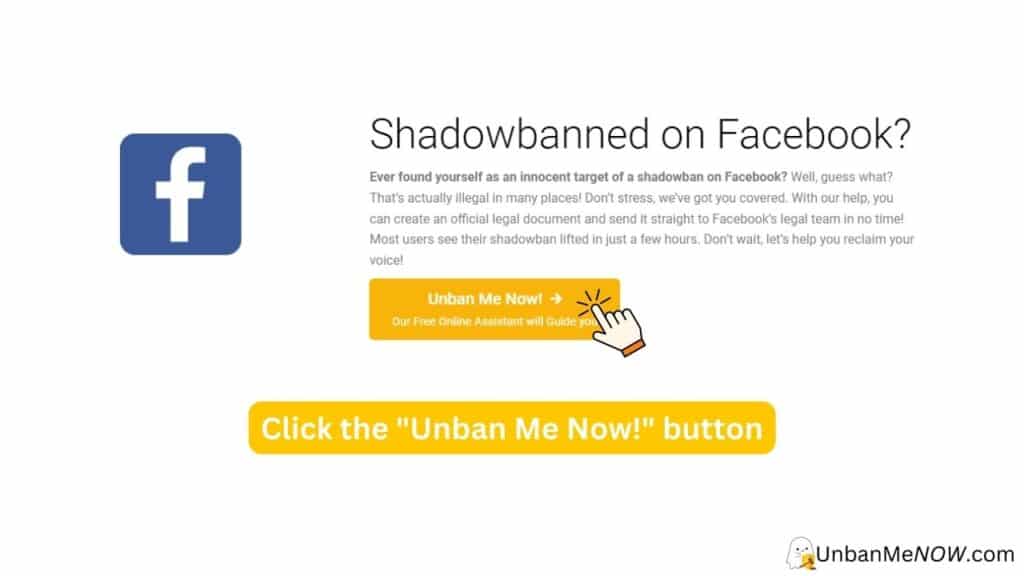
Provide Information: You’ll be asked to provide your full name, email, and platform username linked to your account. This information is necessary to find your account and determine the cause of the shadowban.
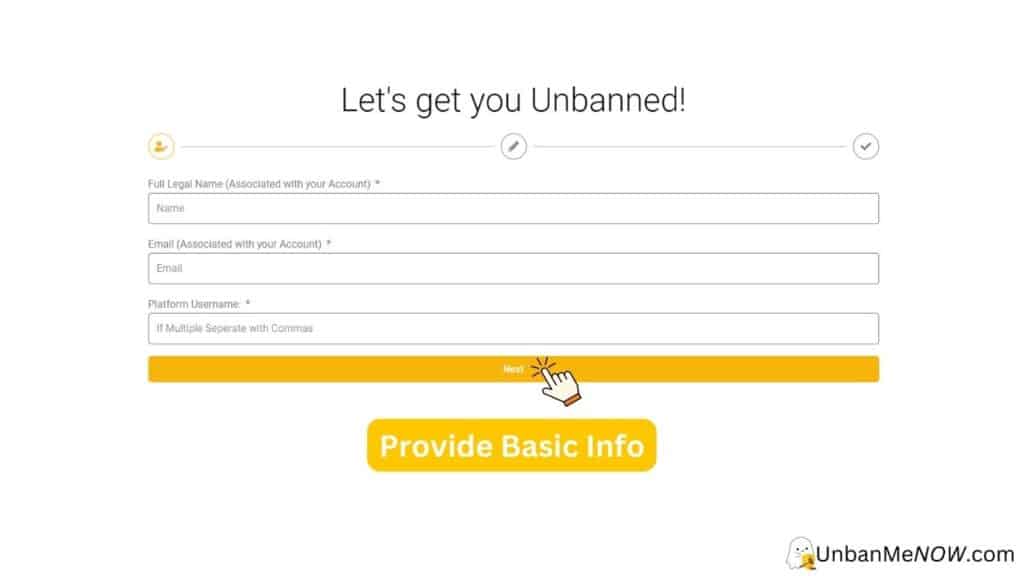
Explain the Ban in Detail: Provide details about why you believe you were shadowbanned and what steps you’ve taken to resolve the issue.
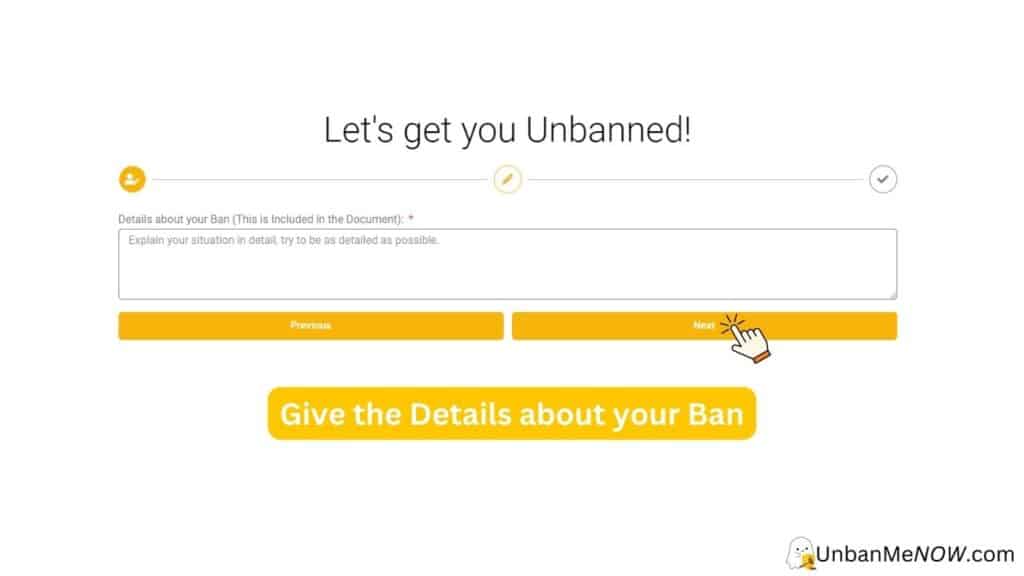
Choose Situation: UnbanMeNow offers several predicament options, select the one that best fits your situation. Agree to the Data Privacy Policy by checking the boxes and confirming the information you provided is true. Then, click “Create Document.”
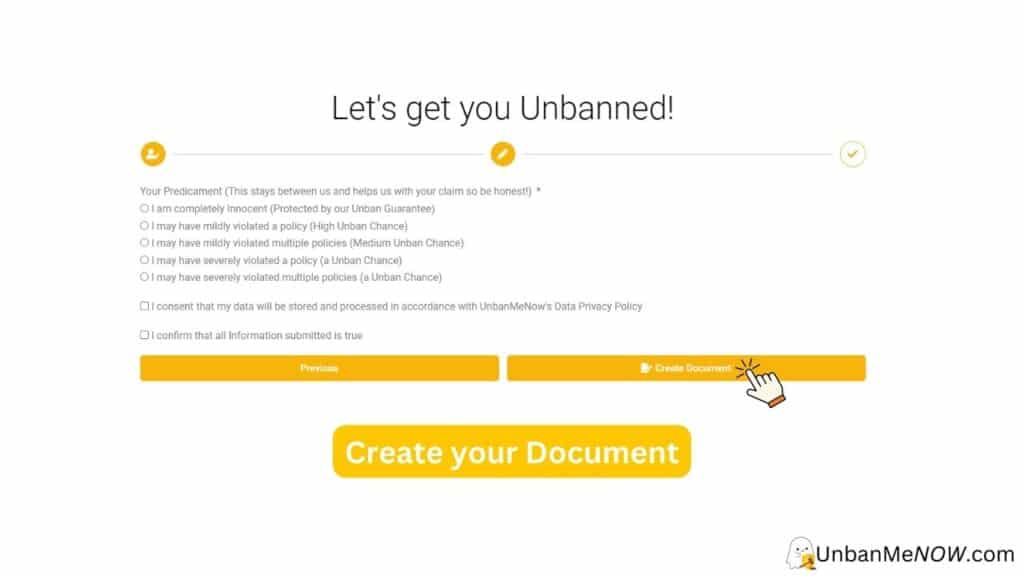
Unban from Facebook Shadowban: Download the document and submit it. UnbanMeNow promises to lift the shadowban within a few hours of receiving the document. Simply wait for the process to complete.
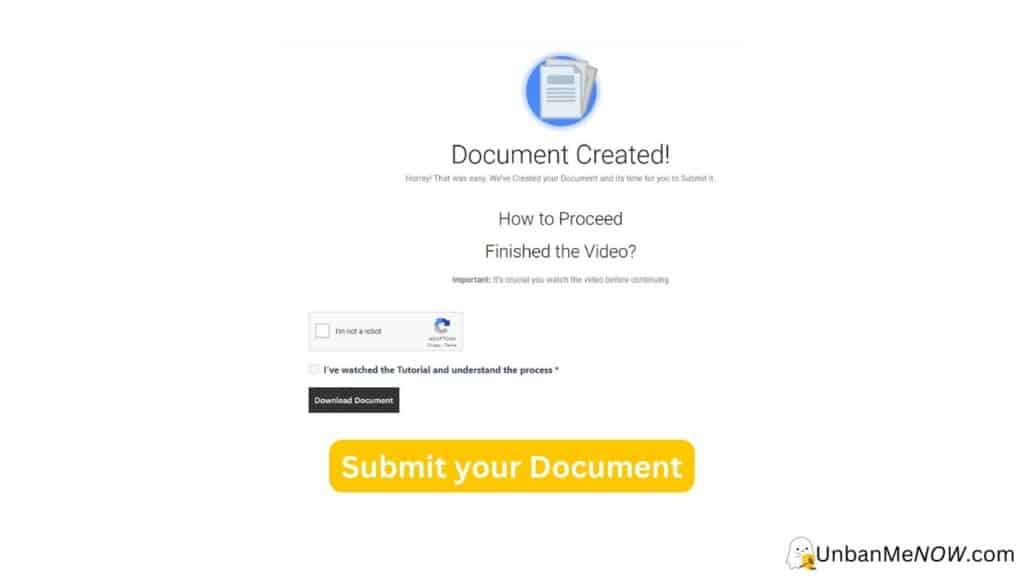
In Summary
Shadow banning on Facebook is the act of making a user’s posts less visible without their knowledge or permission. This can be done by stopping their posts from going to their followers or making their page less visible. The goal of shadow banning is to hide material that Facebook thinks is spam or doesn’t follow its rules for the community. Even though the idea of shadow banning is controversial, Facebook says that it is important to keep its users safe and secure. Still, it’s important for Facebook to be clear about how it works and give users clear instructions on how to keep their material from being taken down.
Frequently Asked Questions
Many users have asked us about shadow banning and how it affects their Facebook experience. Here are some of the most frequently asked questions:
Can I appeal a shadow ban on Facebook?
Yes, you can fight a Facebook shadow ban. If your Facebook account has been shadow banned, you can ask Facebook’s help team to look into it.
How long does a shadow ban last on Facebook?
The duration of a shadow ban on Facebook can vary, and there is no set time frame for how long it lasts. It can depend on the severity of the violation, and Facebook’s policies and enforcement actions can change over time.
What are the consequences of being shadow banned on Facebook?
If you get shadow banned on Facebook, your posts and other content might not be as visible to your friends and other users. This can make it harder for you to connect with your audience and could hurt your online profile and reach. Shadow banning can also lead to account suspension or a lifetime ban in extreme cases.
